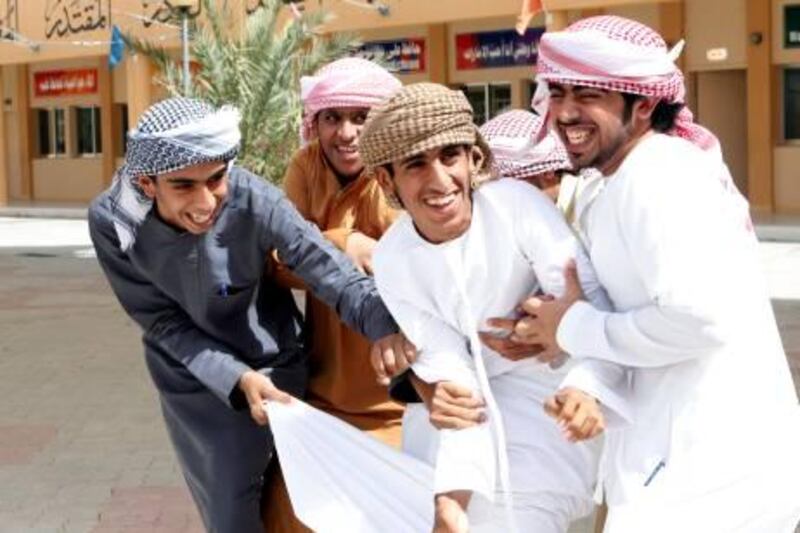SHARJAH // After two weeks of campaigning, the three candidates stood in front of a room full of voters and prepared to make their final pitch.
Abdullah Salem was the first to step forward, holding a piece of paper on which he had jotted down a short speech.
"I will do my best to convey whatever you need and your problems to the council," he said into a microphone. "I am one of you, that's why I'm standing."
Obaid Saeed and Khaled Saeed each then said a few words, before the three stood aside and the ballot papers were handed out.
The 40 voters - students at the boys' school in the town of Thameed, a remote enclave of Sharjah emirate between Dubai and Hatta - are among the approximately 4,000 students participating in ongoing elections by voting for Sharjah's Youth Consultative Council, or Majlis Shura al Shabab.
This is the fourth time voting has been held for the council, whose members serve two-year terms. The first elections were held in 2004, overseen by the Sharjah Youth Centres, part of the emirate's Supreme Council for Family Affairs.
"We want to teach the students to face an audience and prepare them to be leaders," explained Adil Salim, head of Sharjah Youth Centre affairs and one of the election organisers. "We prepare them from now to maybe become Federal National Council members in the future."
The idea, Mr Salim said, is to give the students a platform to raise issues affecting their schools and communities. There are four council sessions a year, each devoted to a specific topic or area of concern, which is decided upon by the members. Representatives from local government authorities are invited to take part in the debate, with the aim of effecting change.
All students in years 10, 11 and 12 in Sharjah government schools are eligible to vote - both Emiratis and expatriates. However, only Emiratis in grades 10 and 11 can stand as candidates, as they have to be able to serve the full two-year term.
The two-week voting period, which began on Sunday, will result in around 80 student representatives - 40 boys and 40 girls - being chosen by their peers. The council members will then select a council president, vice-president and secretary.
Students from 21 girls' schools and 17 boys' schools are voting for one representative from each school to take a seat on the council. Students involved with Sharjah's youth centres for boys and girls will also elect members of the council.
This student activism is supported by Dr Sheikh Sultan bin Mohammed, the Ruler of Sharjah, who normally attends the opening session of the council, which this year will take place on November 25 at the Sharjah Government's shura council.
"The students discuss any issues they might have: from school problems, to health and higher education concerns," said Mr Salim. "They really like the council - it's a new experience for them."
Khawla al Mulla, the manager of the Sharjah Girls Youth Centres, said female members are among the most enthusiastic.
"The girls are maybe more effective because they really care and have strong programmes," she said. "We have helped foster a new culture - to have the students' voices heard and their concerns taken into account."
Shortly before the students from Al Thameed School for Boys gathered to cast their ballots, Khaled Saeed, 16, explained that he stood as a candidate because he wanted to represent his school.
"I think there are certain health problems we could focus on like youth smoking, to try to stop this behaviour," he said. "My friends and family encouraged me to be a candidate." The Al Thameed election was organised by Saeed Abdel Aal, the school's social worker, and was overseen by the manager of the local youth centre, Salem Mattar.
"Only write one name on the ballot paper," Mr Abdel Aal reminded the boys as they made their final choice. The students then stepped up to the transparent ballot box at the front of the classroom to cast their votes, after which the ballots were read out and the numbers tallied on the whiteboard.
In the end it was Abdullah Salem who won, in a landslide, with more than 70 per cent of the vote - a result that was greeted with a roar of applause.
"I really liked this experience, because it makes us feel like we have value and we have some responsibility," said Faisal al Kaabi, 17.






